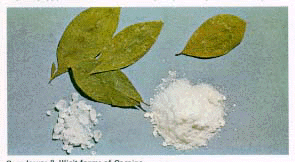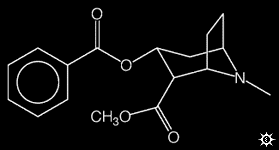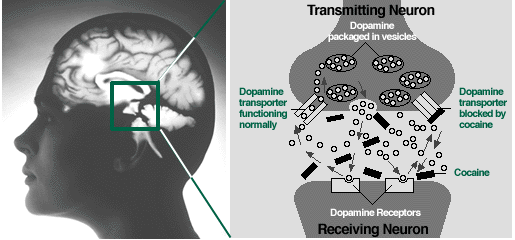Cocaine

Cocaine Leaf and Processed Powder
Cocaine is
a powerfully addicting drug of abuse that directly affects the brain.
The pure chemical, cocaine hydrochloride has been abused for over 100 years,
in fact, coca leaves (the source of cocaine) have been consumed for 1000's
of years. Cocaine is considered a class II drug which means that
it has high potential for abuse, but is allowed to be perscribed and administered
by a doctor for medical purposes.
Chemical Structure
There
are two chemical forms of cocaine, the hydrochloride salt and what is called
the "freebase." Cocaine hydrocholoride is in a powder form and is
able to dissolve in water. It is this form that can be intravenously
or intranasally. Freebase cocaine has not been neutralized by acid
to form the salt. It is this form that is smokable. 
Chemical Structure of Cocaine
What is crack cocaine?
Crack refers
to cocaine when the freebase form has been neutralized with acid forming
the podered cocaine hydrochloride, and has then been formed into a smokable
substance, through treatment with ammonia or sodium bicarbonate and water,
followed by heat to remove the hydrochloride.
Statistics of Cocaine Use in
the United States*
-
In 1997, ~1.5 million Americans
were current cocaine users .
-
Adults 18 to 25 years old have a
higher rate of current cocaine use than those in any other age group.
-
In 1997, there were approximately
604,000 crack cocaine users.
-
From the Monitoring the Future Survey,
lifetime and past year use of crack has increased among eighth graders
to its highest levels since 1991. The percentage of eighth graders reporting
crack use at least once in their lieves increased from 2.7% in 1997 to
3.2% in 1998.
-
Drug Abuse Warning Network (DAWN)
showed that cocaine-related emergency room visits, after increasing 78%
between 1990 and 1994, remained level between 1994 and 1996, with 152,433
cocaine-related episodes reported in 1996.
* Statistics from the 1997 National
Household Survey on Drug Abuse, unless denoted otherwise
How is cocaine consumed?
The principal
routes of cocaine admistration are:
-
oral ("chewing")
-
intranasal ("snorting")
-
intravenous ("mainlining", "injection")
-
inhalation ("smoking")
How does cocaine produce its effects?
Like many
other drugs, cocaine also affects the ventral tegmental area (VTA).
Normally, dopamine is released by a neuron into the synapse where it binds
to dopamine receptors on the neighboring neurons. Usually, dopamine
is then recycled back into the transmitting neuron by a dopamine receptor.
If cocaine is present, it will attach to the dopamine receptor and blocks
the reuptake of dopamine. A build-up of dopamine in the synapse
contributes to the euphoric effects of cocaine.

Effects of Cocaine on the Brain
Short term effects of cocaine use
-
Effects appear almost immediately after
a single dose and disappear within a few minutes or hours.
-
Feelings of euphoria, energy
-
Talkative
-
Mentally alert, especially to the sensations
of sight, sound, and touch
-
Decreasesd appetite
-
Increased heart rate and blood pressure
-
Constricted blood vessels
-
Increased temperature
-
Dilated pupils
-
Large amounts of cocaine intensify
the high, but also leads to bizarre, erratic, and violent behavior.
Tremors, vertigo, muscle twitches, paranoia may also occur with high doses
-
In continual large doses, a toxic reaction
resemling amphetamine poisoning.
Long-term effects of cocaine
use
-
Addiction
-
Irritability and mood disturbances
-
Restlessness
-
Paranoia
-
Auditory hallucinations
-
Tolerance to cocaine's high - leads
to increase in doses to intensify and prolong the euphoric effects.
-
Sensitization to cocaine's anestheitic
and convulsant effects without increasing the dose.
-
Paranoid psychosis
Medical Complications of Cocaine Abuse



